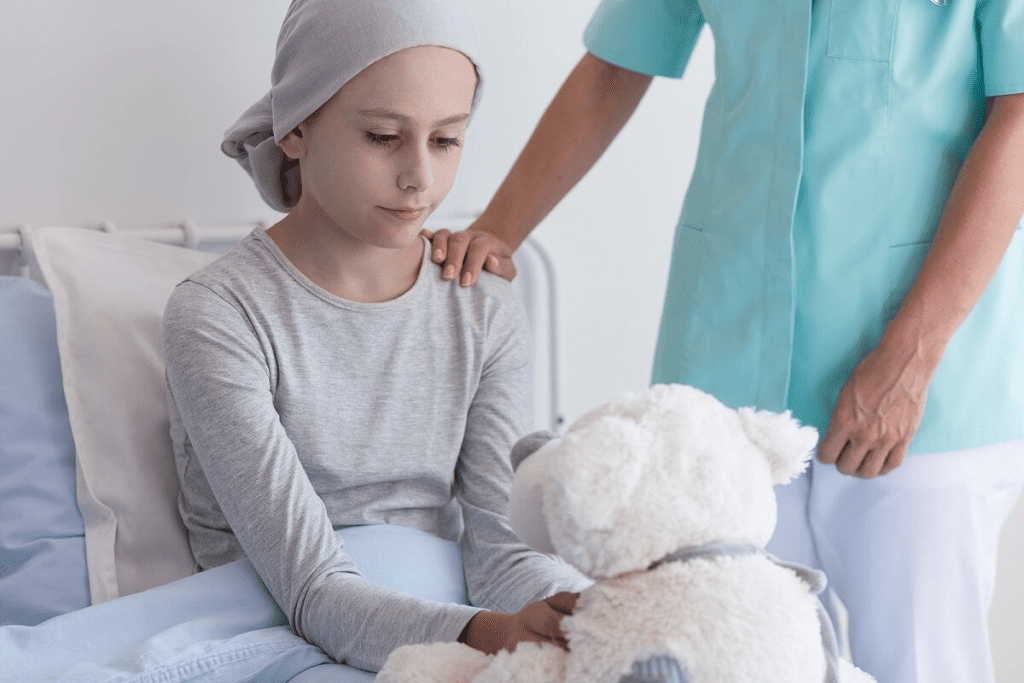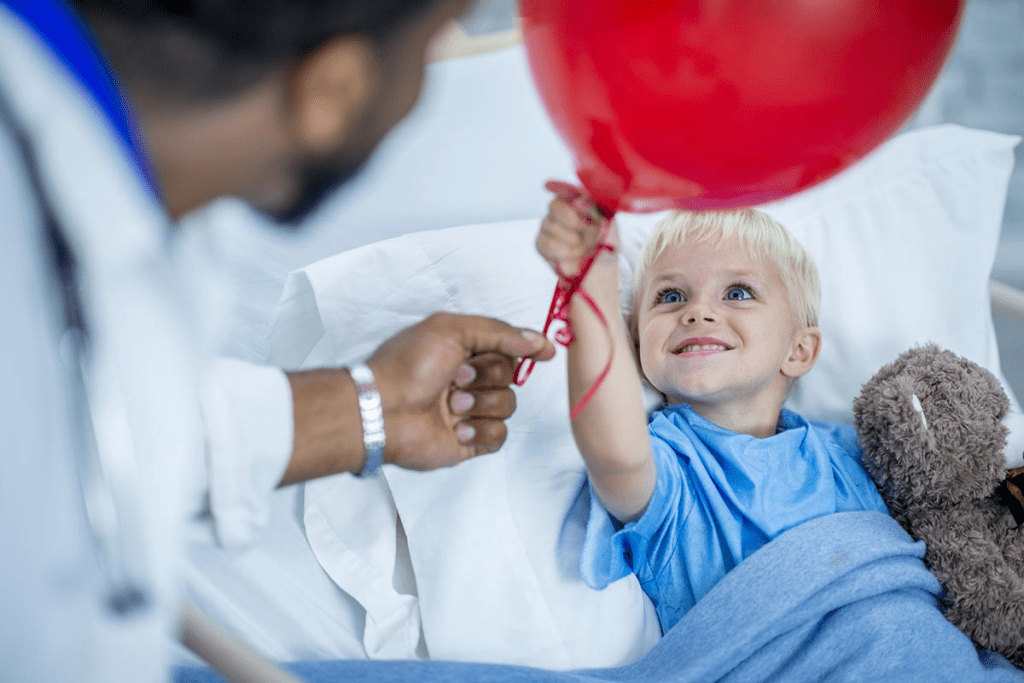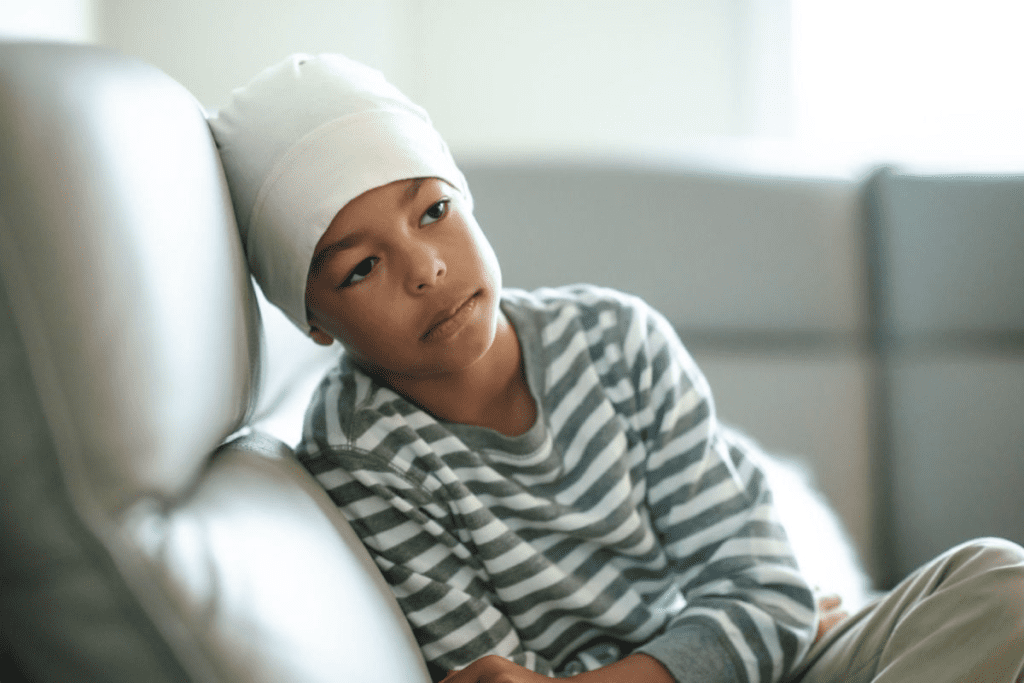Spotting the signs of cancer in a child can be tricky. Small changes in behavior and physical signs can mean a lot. Every year, about 400,000 kids and teens under 19 get pediatric cancer around the world.

Children with cancer show different signs than healthy kids. They might act differently, feel different physically, or show emotional changes. Spotting these signs early can help families get the right help and support.
Key Takeaways
- Early detection of pediatric cancer is key for good treatment.
- Children with cancer show many physical and behavioural changes.
- Knowing childhood cancer symptoms helps get medical help fast.
- Good care and support are important for families facing a cancer diagnosis.
- St. Jude Children’s Research Hospital says over 80% of kids with cancer can be cured in rich countries.
Understanding Childhood Cancer: An Overview
It’s important to understand childhood cancer well for early detection and treatment. Childhood cancer is a complex disease with many types, each with its own challenges.
Childhood cancer is rare but a major cause of death in kids. The most common cancers include leukemias, brain tumors, lymphomas, and solid tumors like neuroblastoma and Wilms tumour. Knowing the signs and symptoms is key for parents and doctors.
Common Types of Childhood Cancer
Leukemias are the most common childhood cancer, making up about 30% of cases. Acute lymphoblastic leukemia (ALL) and acute myeloid leukemia (AML) are the most common types. Brain tumours, like medulloblastoma and glioma, can harm a child’s brain and development.
Lymphomas, including Hodgkin lymphoma and non-Hodgkin lymphoma, are also common. Solid tumours, like neuroblastoma and Wilms tumour, are often found in younger kids and need quick treatment.

Prevalence and Statistics
Childhood cancer rates vary worldwide. In the U.S., over 15,000 kids get cancer each year. Globally, childhood cancer cases are increasing, but the reasons are unclear.
Thanks to better treatments, more kids are surviving cancer. But survival rates differ between rich and poor countries. This shows the need for worldwide help in fighting childhood cancer.
Early Warning Signs of Cancer in Children
It’s key for parents and caregivers to know the signs of cancer in kids. Early detection can lead to effective treatment. We’ll look at the main signs that might mean a child has cancer, focusing on symptoms that don’t go away.
Unexplained and Persistent Symptoms
Children with cancer may show symptoms that don’t stop and can’t be explained. One common sign is unexplained vomiting. This can cause dehydration and weight loss if not treated quickly. Cancer Research UK says persistent vomiting is a critical sign to see a doctor.
Other symptoms that don’t go away include:
- Persistent fever without an apparent cause
- Recurring infections
- Unexplained bruising or bleeding
These symptoms can mean different health problems, including cancer. It’s important for parents to watch these signs closely and see a doctor if they don’t go away.

Physical Changes to Monitor
Physical changes are often the first signs of cancer in kids. These can be:
- Swellings or lumps in the abdomen, neck, or other parts of the body
- Pale skin or easy bruising
- Changes in the eyes, such as squinting or uneven pupils
Doctors say early diagnosis is key to treating childhood cancer well. Watching for these physical changes and telling a healthcare provider can help catch cancer early.
Knowing these early signs and talking to healthcare providers can make a big difference for kids with cancer. We stress the need to be watchful and seek medical help right away if you see any of these symptoms.
Physical Manifestations and Signs of Cancer
It’s key to spot cancer signs in kids early. Cancer in children grows fast and spreads quickly. So, finding symptoms fast is very important.
Unexplained Fatigue
One big sign of cancer in kids is feeling very tired all the time. Studies say 50% to 93% of kids with cancer feel this way. This tiredness doesn’t get better with rest.
Watch if your child always seems tired and if it affects their daily life. This could be a sign we shouldn’t ignore.
Pain Patterns
Pain is another big symptom of cancer in kids. The pain can be in one spot or all over, and it can come and go. Kids might say they have headaches, bone pain, or belly pain. The pain can be different in each child, and we should take any ongoing pain seriously.
If your child has pain that doesn’t go away or is with other bad symptoms, get them checked by a doctor.
Changes in Appetite and Weight
Changes in how much food a child wants to eat and their weight are also important signs. Many kids with cancer eat less and lose weight. But, some treatments or cancers can make kids gain weight. Keep an eye on your child’s eating and weight because big changes are a warning sign.
The American Cancer Society says, “Changes in appetite or weight loss can mean cancer in kids.” We should notice these changes and talk to a doctor if they keep happening.
Gastrointestinal Symptoms in Pediatric Cancer
Pediatric cancer patients often face gastrointestinal issues. These problems can really affect their quality of life. We’ll look at symptoms like unexplained vomiting, nausea, and digestive problems.
Unexplained Vomiting and Nausea
Children with cancer often experience unexplained vomiting and nausea. These symptoms can cause dehydration and malnutrition. Effective management strategies include antiemetic medications, dietary changes, and hydration therapy.
- Administering antiemetic medication as prescribed by the healthcare provider
- Offering small, frequent meals to ease digestion
- Encouraging the intake of fluids to prevent dehydration
Chronic infections like HIV and Epstein-Barr virus increase cancer risk in kids. Managing these infections helps reduce gastrointestinal symptoms.
Digestive Issues and Bowel Changes
Pediatric cancer patients also face digestive problems and bowel changes. These can include constipation, diarrhea, or changes in stool consistency. Monitoring bowel movements and reporting any significant changes is key.
- Maintaining a food diary to track any dietary triggers
- Increasing fiber intake through fruits, vegetables, and whole grains
- Staying hydrated to help prevent constipation
Gastrointestinal symptoms are a big challenge for kids with cancer. Understanding these symptoms and using the right management strategies can improve care. Parents and caregivers need to work with the healthcare team to address these issues.
Sleep Disturbances in Children with Cancer
When kids get cancer, they often have trouble sleeping. This can include not being able to fall asleep or staying asleep. These sleep problems are a big worry for kids with cancer and their families.
Difficulty Initiating and Maintaining Sleep
Insomnia is a big issue for kids with cancer. It makes it hard to fall or stay asleep. Things that can make insomnia worse include feeling anxious, being in pain, and taking certain medicines. A bedtime routine and a cozy sleep area can help.
Cognitive behavioural therapy for insomnia (CBT-I) works well for adults. It might also help older kids and teens with sleep problems.
Excessive Sleepiness That Persists
Some kids with cancer sleep too much and can’t wake up. This could be because of the cancer, treatment side effects, or other issues like anemia. Finding out why they’re so sleepy is key to fixing it. This might mean treating other health problems or changing their treatment.
Fixing sleep problems in kids with cancer needs a big plan. It must look at their health, treatment, and how they feel. By tackling these sleep issues, we can make life better for these kids and help them through their cancer fight.
Psychological and Emotional Changes
Cancer in children is more than a physical issue; it deeply affects their minds and emotions. It also impacts their family, making care for the whole family key.
Anxiety and Nervousness
Children with cancer often feel more anxious and nervous. This can stem from not knowing what’s happening, fearing treatments, or changes in their life. We understand these feelings and need to support them with kindness.
Some signs of anxiety in kids include:
- Restlessness and trouble relaxing
- Fear of being alone or away from family
- Hard time focusing on things they used to enjoy
Depression and Sadness
Depression and sadness are common in kids with cancer. They might feel hopeless, pull away from friends, and lose interest in things they loved. It’s vital to watch for these signs and offer the right help.
Studies show kids who beat cancer are 57% more likely to get depressed and 29% more likely to have anxiety. We need to tackle these mental health issues to help them fully recover.
Long-term Psychological Effects
The long-term effects of childhood cancer on the mind can be big. Survivors might deal with PTSD, anxiety, and depression. Knowing these risks helps us give better support and care.
Ways to help include:
- Regular checks and support for mental health
- Encouraging kids to talk about their feelings
- Helping them find fun activities to feel normal
By recognizing and helping with the mental and emotional changes of childhood cancer, we can offer better care. This not only helps during treatment but also supports their long-term health.
Behavioural Indicators of Childhood Cancer
It’s important to know the signs of childhood cancer early. Kids with cancer might act differently, worrying parents and caregivers.
Loss of Interest in Previously Enjoyed Activities
One big sign is when kids stop enjoying things they used to love. This could be because of the cancer’s physical effects or the emotional stress it causes.
- Withdrawal from social interactions
- Decreased enthusiasm for hobbies
- Reluctance to participate in family activities
Keep an eye out for these changes. They might start small but grow bigger over time.
Irritability and Mood Swings
Kids with cancer might get irritable or have mood swings. These changes can come from the pain, discomfort, or the emotional impact of the illness.
Common manifestations include:
- Increased sensitivity to surroundings
- Frequent mood changes without an apparent reason
- Irritability that is not typical for the child’s normal behaviour
Knowing these signs can help parents and caregivers spot possible cancer symptoms. It’s a good reason to get a medical check-up.
Neurological and Cognitive Signs of Cancer
It’s important to know the neurological and cognitive signs of cancer in kids. Some cancers hit the brain and nervous system hard. This leads to many symptoms.
Headaches and Vision Changes
Headaches are common in kids with cancer, mainly when it’s in the brain. These headaches can be really bad and last a long time. They often come with vision changes.
Vision changes might include blurry vision, seeing double, or losing part of your sight. These issues can really mess up a kid’s day-to-day life.
“Headaches and vision changes in kids need a quick check-up,” says experts. They might find serious problems like cancer.
Concentration and Memory Issues
Cancer and its treatment can mess with a kid’s brain. This can cause concentration and memory problems. Kids might find it hard to learn new stuff, forget things, or struggle with tasks that need focus.
Kids with these problems might need extra help. This could be special classes or therapy to help them deal with these issues.
Balance and Coordination Problems
Some kids with cancer, like those with brain or spinal cord tumours, might have trouble with balance and coordination. This can be anything from being a bit clumsy to really struggling to walk or stand.
Spotting these signs early is key. It helps get the right help fast. This might include physical therapy to make moving around easier and safer.
Knowing these signs helps doctors and parents give kids with cancer the best care. It’s all about making sure they get the help they need.
When to Seek Medical Attention: Recognizing Critical Signs of Cancer
It’s key to spot cancer signs in kids early. Early treatment can greatly increase their chances of survival. We’ll talk about the signs that mean you should see a doctor right away. We’ll also cover why talking well with doctors is important.
Urgent Warning Signs That Shouldn’t Be Ignored
Some symptoms in kids need quick action. Look out for persistent and severe headaches, unexplained vomiting, and big changes in appetite or weight. Also, watch for persistent fatigue, unusual bleeding or bruising, or changes in vision or hearing.
Keep an eye out for neurological changes like seizures, weakness, or balance issues. If a child has persistent pain or unusual behavior, it might be a sign of something serious.
Communicating Effectively with Healthcare Providers
Talking well with doctors is very important. Share your child’s medical history, all symptoms, and any changes. Being ready with questions can help you get the best care.
Clear and open communication is key to a good diagnosis and treatment plan. Make sure you understand what’s happening and what to do next. If you’re unsure, don’t be afraid to ask for a second opinion.
Knowing the signs of cancer and talking well with doctors can help your child get the best care. Quick action and expert care are vital for managing childhood cancer.
Conclusion: Multidisciplinary Care for Children with Cancer
Effective treatment of childhood cancer needs a complete approach. This addresses the complex needs of young patients. We stress the value of multidisciplinary care for children with cancer. It ensures they get the support needed to beat this disease.
Institutions like Liv Hospital lead in delivering top-notch, personalized care. They use the latest protocols. Care that covers all aspects, including palliative care, is key. It helps with the physical, emotional, and psychological needs of the child and their family.
Healthcare providers can offer better support by using a multidisciplinary care approach. This improves treatment results and boosts the quality of life for children with cancer. A holistic approach is vital. It helps young patients face cancer treatment challenges and thrive in the long run.
FAQ’s:
What are the most common types of childhood cancer?
Childhood cancer often includes leukemias, brain tumours, and lymphomas. St. Jude Children’s Research Hospital says these are the most common types.
What are the early warning signs of cancer in children?
Look out for symptoms like unexplained vomiting and physical changes. Also, watch for persistent fatigue, pain, and changes in appetite and weight. It’s important for parents and caregivers to keep an eye on these signs.
How does cancer affect a child’s gastrointestinal system?
Cancer can lead to vomiting, nausea, and digestive problems in kids. These symptoms are distressing and need quick medical help.
Can cancer cause sleep disturbances in children?
Yes, cancer can disrupt a child’s sleep. This can include insomnia or too much sleepiness. These issues can really affect their quality of life and need to be managed.
What are the psychological and emotional changes experienced by children with cancer?
Kids with cancer might feel anxious, depressed, or have long-term psychological effects. It’s key to address these changes for their overall care.
What behavioural indicators may suggest childhood cancer?
Look for signs like a loss of interest in activities and irritability. Spotting these changes can help identify kids who might need a medical check-up.
What are the neurological and cognitive signs of cancer in children?
Neurological and cognitive signs include headaches, vision changes, and trouble concentrating. Balance and coordination problems are also signs. These symptoms need careful evaluation and management.
When should I seek medical attention for my child?
Seek medical help if your child shows urgent warning signs of cancer. It’s vital to talk clearly with healthcare providers for timely care.
How important is multidisciplinary care for children with cancer?
Multidisciplinary care is key for kids with cancer. It ensures they get all-around support to beat cancer and thrive. Places like Liv Hospital are important in providing this care.
What is the survival rate for children with cancer in high-income countries?
St. Jude Children’s Research Hospital says over 80% of kids with cancer can be cured in high-income countries. This is with the right services.
References
- Cancer Research UK. (2023). Signs and symptoms of childhood cancer. Retrieved fromhttps://www.cancerresearchuk.org/about-cancer/childrens-cancer/symptoms
- National Cancer Institute. (2023). Childhood cancer. Retrieved fromhttps://www.cancer.gov/types/childhood-cancers























